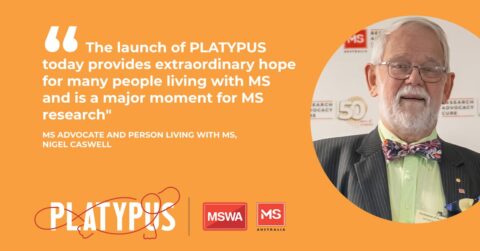Adaptive clinical trial in Australia offers new hope for progressive MS
The first adaptive clinical trial for Australians living with MS
Last updated: 29th November 2023
The first adaptive clinical trial for Australians living with MS, starting in January 2024, will seek to reverse neurological damage caused by progressive MS.
With an initial $4 million (€2.5 million) in funding, the trial will enable researchers to investigate the potential benefits of several medications simultaneously, giving hope to the people living with progressive MS, whose treatment options are limited.
Working with a national and international group of clinicians and researchers, the multi-arm, multi-stage (MAMS) adaptive, innovative design, known as PLATYPUS (PLatform Adaptive Trial for remYelination and neuroProtection in mUltiple Sclerosis), will test two repurposed drugs alongside each other, providing more timely results about whether the treatments are working.
PLATYPUS is an extension of the OCTOPUS (Optimal Clinical Trials Platform for Multiple Sclerosis) clinical trial, funded by the MS Society UK and launched April 2023.
Neurology Professor Simon Broadley from Griffith University’s School of Medicine and Dentistry and Chief Investigator of PLATYPUS, says the funding was critical and the new trials will allow the testing of multiple potential therapies simultaneously and bring results much faster than traditional clinical trial methods. Professor Broadley said:
‘Collaborating with our OCTOPUS partners in the UK, we’ll be trialling the drugs metformin, which is typically used to treat type 2 diabetes, and alpha-lipoic acid which is a health food supplement, these therapies have shown promise in promoting neuroprotection and/or myelin repair in MS.’
The PLATYPUS trial will be rolled out across Australia through a collaboration of 20 academic and healthcare institutions and aims to recruit more than 250 participants in Australia.
‘These multi-arm, multi-stage trials will require less time and fewer participants to assess the efficacy and cost-effectiveness of metformin and alpha-lipoic acid,’ Professor Broadley
The PLATYPUS team includes leading, internationally recognised neurologists, neuroscientists, statisticians and health economists covering five states across Australia, as well as people with progressive MS. Learn more in the video below.
MSWA (a state member of MS Australia) is the leading funder of the trial, having contributed $3 million (€1.8 million) to PLATYPUS. Melanie Kiely, CEO at MSWA said:
’PLATYPUS has the potential to deliver a significant breakthrough, as we aim to provide real-life outcomes which positively impact the lives of people living with progressive MS – which is always our focus…By testing two repurposed drugs, we hope to find a treatment which can be quick to market for the people we support,’
CEO of MS Australia, Mr Rohan Greenland, said that despite a number of traditional clinical trials for progressive MS in Australia, there is currently no treatment that repairs damage in progressive MS. Mr Greenland said:
‘The launch of PLATYPUS today is a major milestone, the first adaptive clinical trial for MS in Australia. This will ensure a treatment opportunity for people with progressive MS, the greatest unmet need in the MS landscape,’
Mr Nigel Caswell, who was diagnosed with MS in 1993, said:
‘The launch of PLATYPUS today provides extraordinary hope for many people living with MS and is a major moment for MS research,’

President of MS Australia, Associate Professor Des Graham, says he is personally and professionally delighted for Australia’s MS community that PLATYPUS can now be realised. Associate Professor Graham said:
’With a $3 million grant from MSWA and a $1 million grant from MS Australia, this revolutionary adaptive trial provides tremendous promise for those living with progressive MS in Australia and MS Australia is extremely proud to lead this initiative,’
Read more from MS Australia here.
